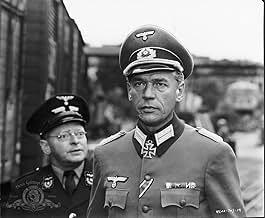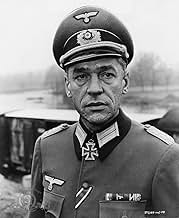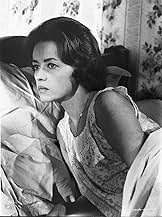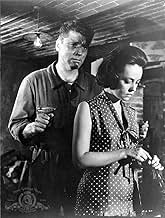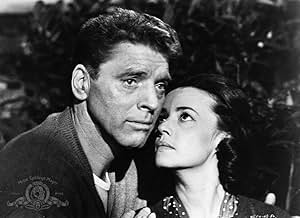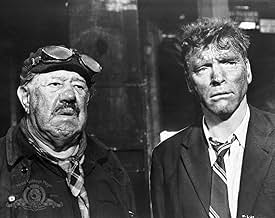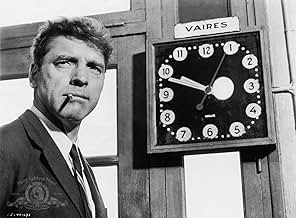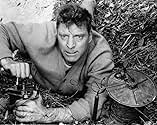In 1944, a German colonel loads a train with French art treasures to send to Germany. The Resistance must stop it without damaging the cargo.In 1944, a German colonel loads a train with French art treasures to send to Germany. The Resistance must stop it without damaging the cargo.In 1944, a German colonel loads a train with French art treasures to send to Germany. The Resistance must stop it without damaging the cargo.
- Nominated for 1 Oscar
- 1 win & 3 nominations total
- Didont
- (as Albert Remy)
- General Von Lubitz
- (as Richard Munch)
- Sergeant Schwartz
- (as Donal O'Brien)
- Pilzer
- (as Art Brauss)
- Major
- (as Jean-Claude Berco)
Featured reviews
Burt Lancaster stars as a French train engineer that has to transport the shipment. At first is not a easy task, but he succeeds in the end. Meanwhile he becomes friend with a hotel owner played by French actress Jeanne Moreau (that passed away last year). And the other members of the cast are fine. Paul Scofield as a German general is great (and Scofield also starred in other great movies after this), and it was a treat seeing French comedian Michel Simon in a war movie (just like Bourvil in THE LONGEST DAY).
This movie had great direction by John Frankenheimer, great performances by all the actors, and also great photography in Black and White. Although a bit dragged in some places, it was still great to watch! And as a fan of the history from 1850 until these days, I liked the movie for his accuracy and his action scenes.
John Frankenheimer directs in stark black and white, and the film has his trademarks all over it -- kinetic compositions, rapid-fire editing, ragged documentary look and feel. Paul Scofield also stars as the obsessed Nazi and Jeanne Moreau has a role as a French woman who reluctantly aids and abets Lancaster. The sheer physical production is astounding; in the days before CGI would have done everything for them, Frankenheimer and company staged massive set pieces involving bombed railroad yards, crashing trains, you name it. I can only imagine how much pressure the special effects guys were under to get everything right the first time because re-staging it for a second try would have been a bear.
"The Train" brought Franklin Coen and Frank Davis an Academy Award nomination for Best Original Story and Screenplay at the 1965 Oscars.
Grade: A-
The centerpiece of the movie is a clash of wills between Von Waldheim, a cultured but iron-backed Nazi colonel (well-played by Paul Scofield) charged with getting the stolen artworks to Germany, and a taciturn railway troubleshooter named Labiche (Burt Lancaster). Von Waldheim first enlists Labiche as 'insurance' against any monkey business during the train's journey. Labiche, though, happens to have Resistance connections and, with serious reservations, is drawn into a desperate, improvised plot to stop the train, preferably without damaging the precious artifacts inside.
Although easily enjoyed as a straight action flick, what gives the film weight is the supporting story, in which Labiche at first argues against wasting precious lives on a few crates of paintings he's never seen, then gradually comes round as he begins to understand that the Nazis are effectively carrying off a large piece of the heart of France. Beautiful deep-focus black and white photography, and solid supporting performances by a mostly French cast (of which Jeanne Moreau may be the best-known), convincingly evoke the bleak misery of the Occupation. John Frankenheimer's economical direction manages to present highly-charged action scenes without glossing over the human cost, as Von Waldheim exacts savage reprisals against escalating efforts to hinder the train's passage.
Lancaster, who performed his own stunts, is excellent, furiously athletic as he slides down ladders, leaps onto moving locomotives, and charges over ridges and fields in pursuit of the train. At the same time, he manages to effectively bring a subtle authenticity to his portrayal of the weary, fatalistic railwayman.
Finally, the action set-pieces are nothing short of stunning, and include the train's mad dash through an Allied carpet-bombing attack, a strafing raid on a speeding locomotive, and several wrecks and derailments, all staged full-scale with period equipment donated by the French national railway. Well worth obtaining on DVD, the film may be hard to find on broadcast television these days.
Seeing 'The Train' two days ago, what instantly came to my mind after watching was "wow!" Like most people here, to me this was a pretty exceptional film that really packs a punch in a way that not many films of its year, decade or even genre at this point of film history did. Truly powerful work that took risks and pulls no punches in a way that still has the ability to shock, no trivialising or sugar-coating here. Quite the opposite. As far as WWII films go, it is one of the best and despite being highly praised deservedly more people should know about it, it is really quite something and unlike a lot of films personally seen.
Maybe 'The Train' runs a little too long by about 15 minutes or so, which occasionally (emphasis on that word) affects the pace.
On occasions too early on, for my tastes Maurice Jarre's music score jarred a bit and like it belonged more in a comedy.
Conversely, there are so many strengths (which is actually pretty much everything else) and everything else is executed flawlessly. 'The Train' is quite masterful visually, the photography is full of atmosphere and played a huge part in making the train itself like its own character. Have never seen a train so cleverly, intimately and powerfully used. The French locations are incredibly well utilised, some of the best use of French locations for any film seen in a long time from personal view. On a technical level, the action with the train is enough to make the jaw drop today. Frankenheimer's direction is hugely accomplished and not since 'The Big Parade' as far as recent film viewings go has there been direction for any film that was this visually flawless. Most of Jarre's score works very well, when it becomes more subtle and more harmonious with the atmosphere it is quite hauntingly unsettling.
Script is very intelligent and thought-provoking, taut enough while allowing breathing space yet not rambling. The story is hugely compelling, is very intense especially the exciting action with the train and is emotionally powerful. Found myself quite moved and shocked at how much the more uncompromising moments (and there are many) wrenched the gut, haven't seen an ending this poetic in a while either. The characters are well defined and interesting. There are great performances from all, with Lancaster superb in one of his best performances. He tells so much with his face and eyes and could tell he meant every word with his line delivery, he is especially good in the last twenty minutes where words are few but one intensely feels his hurt and anger. Scofield has seldom been nastier or at times even frightening. Jeanne Moreau's role isn't huge but she is sympathetic in it and an atypically cast Michel Simon is very telling in his.
In summary, exceptional and one of the best WWII films. 9/10
Storyline
Did you know
- TriviaBurt Lancaster performed all his own stunts in this movie. Albert Rémy also got into the act by performing the stunt of uncoupling the engine from the paintings train on a real moving train.
- GoofsWhen the German officer in the train thinks they've arrived in Germany, he takes a look at his map and we see Strasbourg (Alsace, France), the France-Germany border and Baaden-Baaden (Germany). During German occupation of France, Alsace and Strasbourg were annexed to the German Reich, i.e. this German military map should have shown a different border (100 km West) and Strasbourg should have been in Germany.
- Quotes
Colonel von Waldheim: Labiche! Here's your prize, Labiche. Some of the greatest paintings in the world. Does it please you, Labiche? Give you a sense of excitement in just being near them? A painting means as much to you as a string of pearls to an ape. You won by sheer luck: you stopped me without knowing what you were doing, or why. You are nothing, Labiche -- a lump of flesh. The paintings are mine; they always will be; beauty belongs to the man who can appreciate it! They will always belong to me or to a man like me. Now, this minute, you couldn't tell me why you did what you did.
- Crazy creditsOpening credits prologue: PARIS August 2-1944 1511th day of German occupation
- Alternate versionsWhilst the official run time is 133 minutes, the BBFC website has two separate entries, one with a theatrical 'U' rated certificate in 1964 running at 141 minutes 31 seconds and the other entry with a theatrical 'A' rated certificate in 1959 running at 90 minutes 37 seconds. Though the second entry seems incorrect due to the erroneous date of certification being 21 October 1959 (the film was being made in 1963 and is copyrighted in 1964) and a much shorter run time, the BBFC reference numbering is in sequence with the later video rated entries so it is unknown if this 1959 entry is a much shorter cut of this film or this is an error in the BBFC records. It is also not known if the 142 minute entry is a longer cut of the film that has simply not been since it's UK theatrical release in 1964.
- ConnectionsFeatured in Film Review: Burt Lancaster (1968)
- How long is The Train?Powered by Alexa
Details
- Release date
- Countries of origin
- Languages
- Also known as
- El tren
- Filming locations
- Acquigny, Eure, France(trains pile-up, 49°10'22.73"N, 1°10'44.84"E)
- Production companies
- See more company credits at IMDbPro
Box office
- Budget
- $6,700,000 (estimated)
- Runtime2 hours 13 minutes
- Color
- Aspect ratio
- 1.66 : 1
Contribute to this page



